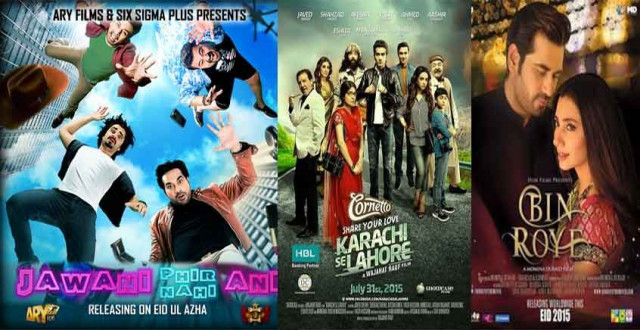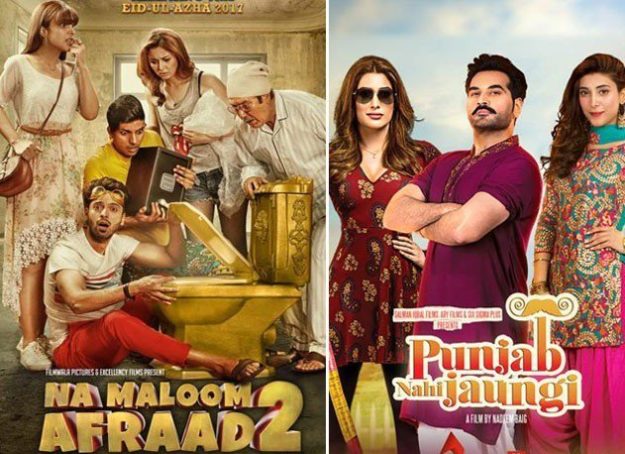How will the elections affect Pakistan’s entertainment industry?
Next government will need long-term vision to utilise showbiz in improving the country’s socio-economic conditions

PHOTO:FILE
In the last decade, we’ve had little help from the government in helping to stabilise and nourish Pakistan’s nascent entertainment industry. While some taxes have been reduced and some policies were indeed introduced last year, there are no institutions or funds available for film-makers and the investment in local films has mainly come from corporate and private sources.
It was only earlier this year that Marriyum Aurangzeb, the Minister of Information, Broadcasting and National Heritage, announced the first film-related policy which exempted duty on the import of film equipment and promised to establish film studios, amongst other things.
Showbiz people welcome national film, culture policy
Further, in the federal budget for 2018-19, more incentives were announced, including a reduction in customs duty on the import of production equipment to 3% and sales tax to 5%. The package also guaranteed funds for the promotion of local films, dramas and artists.
One can’t help but wonder how the new leadership, whoever it will be, can affect the local entertainment sector, specifically films. The Express Tribune examined the manifestos of the three major contesting parties, Pakistan Tehreek-e-Insaf (PTI), Pakistan People’s Party (PPP) and Pakistan Muslim League – Nawaz (PML-N), to gauge how big a part each of them think the cultural industry plays in the future of Pakistan.
It was interesting to see how political parties phrase their manifestos when it comes to this. It shows how much thought they’ve put into it and almost always, that not many of them have a nuanced understanding of the challenges faced by those working in the industry.
 PHOTO:FILE
PHOTO:FILEPTI promises state patronage to sports, arts and culture by providing the necessary resources alongside local and international exposure to athletes and artists. It says they will “partner with local and international private partners to hold expos, exhibitions, literary festivals, art and culture shows and events to boost Pakistan’s image.”
In addition, Imran Khan and his team pledge to create “scholarships and fellowships to promote Pakistan’s image in varsities across the world” and “revitalise Pakistan’s National Council of Arts and create art and culture exchange with international art councils and bodies to provide international exposure.”
While PTI’s manifesto acknowledges we only have a handful of art, film and literary festivals in Pakistan, none of which are through state patronage, the party offers to establish community centres where such events can take place. Unfortunately, it fails to specifically address the film industry. Besides one mention of the lack of film festivals, it doesn’t promise a specific goal PTI would like to achieve for the industry.
Final day: literature festival lives up to expectations
On the other hand, PPP’s manifesto states the importance of art, culture and literature not only for a soft image of Pakistan but also as critical tools for rebuilding society. It promises the establishment of a Peoples Film Council to annually seed money allocated for “films, art and cultural development, as well as for the betterment of artists.”
The party also vowed to “promote and protect public spaces including museums, parks, public squares, art galleries, cultural complexes, cinema halls and theatres across cities and in the rural areas.” While PTI offers to revitalise Pakistan’s National Council of Arts, PPP submits the establishment of several auditoriums and open-air theatres at a district level, which will be citizen-led and state-supported.
PML-N’s manifesto is the most interesting one though. It lists their own achievements in the current tenure and the goals for the future, if elected again. With Aurangzeb’s efforts, the first Film and TV policy was devised and the first-ever Pakistan International Film Festival was held in Karachi, earlier this year. Further, the Chinese market was opened for Pakistani films and film-makers.
 PHOTO:FILE
PHOTO:FILEThe manifesto further states PML-N will “formulate Pakistan’s Anti-Piracy Policy to protect rights of producers and film-makers.” It proposes the founding of a ‘Film City and Film Institute’ and a ‘National Media, Culture and Film Museum.’ While the Film City may be too big an aspiration, the manifesto addresses an important issue: affordable cinemas. With ticket prices ranging between Rs500 to Rs1,000, going to the theatre isn’t viable for the general masses, therefore limiting footfall. It also proposes the launch of a National Artists Assistance Fund, and Film Finance Partnership Fund in collaboration with the corporate sector.
Each party’s record speaks for itself. But it’s not unfair to say the manifestos are generally worded in so vaguely that it’s hard to guess how their goals will materialise. What one can make out is that the highest focus is on art councils. Very little is said about nurturing the film industry.
It’s unclear what “promoting and protecting cinema halls” entails, as opposed to building new ones, especially in rural areas. Only PML-N sort of addresses that by suggesting affordable cinemas “across the country.”
 PHOTO:FILE
PHOTO:FILETruth be told, Aurangzeb’s work over the last two years has led to Pakistani cinema officially being given the status of an industry. But again, some of PML-N’s proposals – like Film City – are too far-fetched.
There are also similarities between PPP and PML-N’s manifestos, in terms of how they aim to establish funds for film-makers. But the most pivotal suggestion is regarding piracy. Hundreds of DVD stores sell pirated copies of local and foreign content, without any ramifications. Several films are telecasted by cable operators on the day of their release, which not only affects revenue but further promotes piracy.
Each party promises to work for the betterment of the creative industries. Each has its own goals and agendas. But there is a lack of vision. This is why policymakers must step foot smack in the middle of the action and get a closer look so as to understand the business better.
While the corporate sector and private investment can only take the industry so far, the next government will need to take full patronage. It needs a long-term vision to utilise the entertainment industry in improving the socio-economic conditions of Pakistan.
Have something to add to the story? Share it in the comments below.



















COMMENTS
Comments are moderated and generally will be posted if they are on-topic and not abusive.
For more information, please see our Comments FAQ